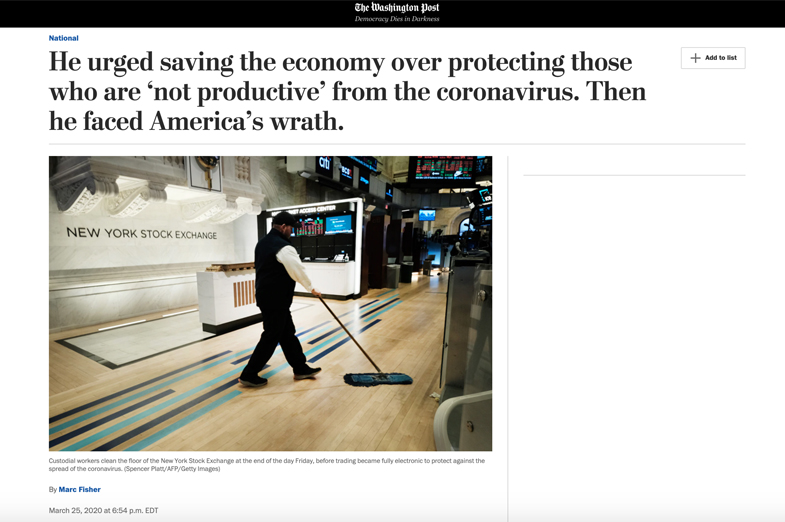Almost every American has undergone a lifestyle change in the wake of the deadly and infectious coronavirus. Almost three million have lost gainful employment and patiently wait on government assistance. None of these circumstances have, however, stopped our brave news media from carrying out their dutiful mission — dividing us.
In the latest Gallup poll, the president, hospitals and even Congress are all rated favorably. The only institution whose disapproval rating has increased is the news media, with 55 percent viewing it unfavorably. It’s not particularly hard to understand why. At almost every turn, the news media has attempted to make this pandemic about themselves, and the pointless work they choose to engage in.
The most egregious example of this comes courtesy of Marc Fisher, senior editor of the Washington Post, who yesterday authored a piece titled ‘He urged saving the economy over protecting those who are “not productive” from the coronavirus. Then he faced America’s wrath’ about a single tweet from California attorney Scott McMillan, a man with 495 Twitter followers.
‘The fundamental problem is whether we are going to tank the entire economy to save 2.5 percent of the population which is (1) generally expensive to maintain, and (2) not productive.’ McMillan tweeted, seemingly in defense of a debate on social media about when the country should attempt to re-open itself economically.
At the time the Washington Post embedded a screenshot of the tweet, it only had 8 retweets and 17 likes: a grand total of 25 engagements. McMillan is not a social media influencer. He is not a verified user. By all accounts he is a random private citizen with a Twitter account expressing an opinion, something becoming more and more verboten, even without a horde of bored quarantined journalists.
The story did not end with McMillan, per Marc Fisher, who contacted the 56-year-old attorney’s elderly parents for comment, painting his hit job as a tale of a struggling family; the insinuation being that McMillen wanted his own parents to die off in sacrifice of stabilizing the economy.
There is an alarming trend in the media where powerful conglomerates and journalists eager to weaponize their byline seek out vulnerable targets they can bully or manipulate in the hope of making their click quota.
Two years ago, CNN infamously tracked down a person responsible for creating a wrestling GIF lampooning their corporate logo, which just happened to be retweeted by President Trump. A CNN editor said the only reason they did not reveal the man’s identity was that he apologized for the meme and promised not to do it again.
CNN reporter Drew Griffen tracked down a senior citizen in Florida and parked a camera crew on her front lawn, accosting her over her Facebook group which he claimed was a Russian front group that bought ads on Facebook that swayed the 2016 election.
This browbeating of everyday people on social media by activist journalists has become all too familiar. The problem with publishing stories like Marc Fisher’s in the Washington Post is that there are more people with a voice to pushback on this kind of random targeting.
Within minutes of Fisher declaring on Twitter that he had contacted McMillen’s parents, he faced a tidal wave of backlash from people with plenty more than 495 followers.
Scott McMillan, a 56-year-old lawyer, tweeted that it's more vital to revive the economy than to save people who are ‘not productive,’ like the elderly and infirm. So I called his parents. https://t.co/czDOkbGI49
— Marc Fisher (@mffisher) March 25, 2020
People all over the country are scared and losing jobs. The more the media doubles down on sowing division, the more President Trump’s poll numbers will continue to increase, whether or not they choose to carry his daily briefings or not.
If ever there was a time to reconsider their business model, now would be it.


















